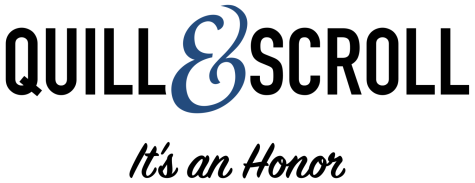Skills are best applied to solve real-world problems
By Erinn Aulfinger
Lakota East (Ohio) HS, Class of 2017
(Editor’s Note: Erinn Aulfinger is one of two 2017 winners of the George and Ophelia Gallup Scholarship awarded by Quill and Scroll. She is a freshman at Ohio State University in Columbus.)
I’ve had great leadership opportunities in organized activities and clubs in high school, including as Chief Editor of Lakota East’s award-winning newsmagazine, The Spark, this past year. But I believe the true proof of the skills we learn is how we apply them.
The true proof of our personal values is whether we put them to the test. For me, leadership goes beyond serving in a structured capacity. Service goes beyond school-mandated volunteer hours. Both come down to a choice: Step out of the safety of organized activities and make your own mark on the world, or let others be the pioneers to set the vision and brave the unchartered path as you follow safely behind.
That philosophy was put to the test these past two years when I uncovered an issue in my southwestern Ohio community.
There’s a sickness running rampant through the hallways of our schools, infiltrating households, and raging, unchecked, throughout public places across America. It’s plaguing our children, yet there’s no outcry of outrage or fear. No hot debates on national TV citing numbers of people won or lost. No white-coated CDC experts highlighting the problem.
Industry reports say girls see a significant drop in self-esteem around age 9 that’s both deeper and longer-lasting than that of boys. This drop is driven in part by body image issues, bullying, and societal gender bias. Girls with low self-esteem are more likely to suffer from depression, self-harm, and premature sexual activity, yet only a few organizations are offering solutions. Words have unmistakable power, and the halls of middle or high school have the uncanny ability to bring out the worst of them.
Walking the school halls since I turned 9 years old, I’ve seen friends succumb to the pitfalls of low self-esteem, including cutting, eating disorders, and drug usage. I’ve watched the rise of “mean girls” bullying others, and of adults treating girls differently than boys, both worsening the problem. I wondered how I could harness the power of words in a more positive light, curing the disease of poor self-esteem by stopping the spread before girls were infected. Perhaps by giving younger girls a “vaccine” to prevent the development of negative thoughts, I could prevent the spread of a weakening sense of “girl power.”
My solution was to create, fund, and publish a book designed for sixth-grade girls about to face new pressures from peers, teachers, parents, and puberty. My book, “Rewriting Your Story,” includes inspirational stories from older girls and women who’ve overcome self-esteem issues, along with exercises and tips to give girls tools to help avoid that self-esteem drop.
I developed a detailed year-long action plan, contacted more than 1,000 organizations for research, raised $5,000 in printing costs, persuaded women to share their stories, and taught myself design software to do my own layout. With permission from 10 elementary school principals, I distributed a free book to the 700 sixth-grade girls in my school district this past fall, and posted a free online copy for girls globally.
The book is achieving my goal of changing lives and helping girls learn to treat themselves and each other better.
“I realized I was treating another girl … in a way I wouldn’t want to be treated, so I changed,” one girl said.
“I decided that if all those women could see themselves as pretty, so could I,” said another.
A parent told me “I have an older daughter who’s struggled with much of the subject matter… so thanks for changing the world one page at a time!”
This project taught me new skills like project management and fundraising, introduced me to strong female leaders globally, and raised my own confidence as I tackled a project others initially told me “couldn’t be done”.
Words can cause a sickness in heart and spirit. I hope my book can be one small part of the cure.


Comments are closed.